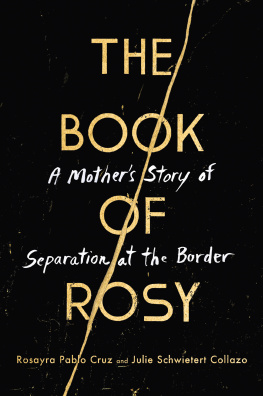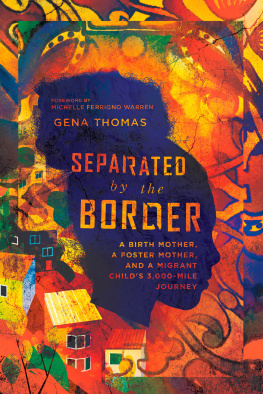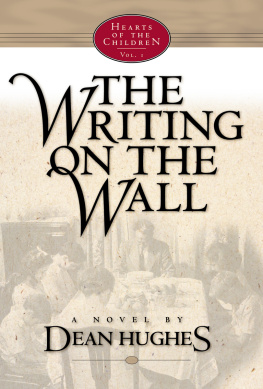Rosayra Pablo Cruz.
When said with love, my first name rolls off the tongue, the trilled rs cascading over so many soft vowels, like Guatemalas crystal clear Ro Azul rippling over smooth stones. But the guards voice is brusque and gruff, bothered. It isnt her job to love, nor to even think about the first names of the detainees being held in their cells here at the Eloy Detention Center in Arizona. We are last names only. We are numbers. Nine numbers, in fact, which, when punched into immigrations online database, can tell you who someone is and where and when they were born.
What it cant tell you is that thirty-five years ago and more than two thousand miles away, my mother, Fernanda Cruz Pablo, labored at home for nearly twelve hours, at least half of those in a darkness punctured only by the flickering light of a fire made with branches of ocote, an evergreen that gives up its piney fragrance when burned. Refugio, one of our towns midwives, sat by her side and prepared my mother for the final push. As I was born, my mother sent up a prayer that God would bless and keep me, and that He might, if she could be so bold to ask, even make my life a little bit easier than hers had been so far.
The guard calls my name again, with even more roughness in her voice.
PABLO CRUZ. VISIT.
I stir from the bottom bunk in my cramped cell, glancing at her in disbelief. I demur and shake my head. No, I cant possibly have a visitor. I dont know anyone in Arizona. I havent taken the advice of fellow detainees to reach out to an attorney who might be able to help me, not even after my cell mate spent her own commissary money on a phone call to my family in Guatemala, urging them to persuade me to call the lawyer. Rosayra, she whispered to me, at least call him. See if he can help you! What do you have to lose?
Why bother? I thought, repeating the question to my oldest sister, Elvira, when we managed to speak on the phone. I have no money to pay for a lawyer, and neither does my family. In fact, we have all taken on debt for me to be able to come to the United States with my sons, and we are all under pressure to pay it off quickly, with interest. The sooner I can get out of here, the sooner I can be with my sons, file for asylum, and get a work authorization permit. Once I have that permit, I can earn some money, pay off my debts, and make sure my family is taken care of. The process wont be fast, I know, but every day that I am in here is a day that I cause my family stress, as they worry about what I owe. Every day that I am in here is a day that puts them at risk, for unpaid debts can mean a death sentence in my country.
This is the reality for nearly every migrant from Central America who flees to the United States. Almost no one has money to make the journey on their own, so they borrow it from people who do. Then, they are bound to the obligation of repaying it, usually thousands of dollars, with interest. You cant possibly understand how fast interest accrues until youve made one of these deals and lived with the anxiety of meeting the payment deadlines.
Lets GO, Pablo Cruz!
La Miss, the name we use for all of the guards, is getting really annoyed now.
This must be a mistake. The idea that someone would have traveled to this dusty desert town and its for-profit immigration prison just to see me is inconceivable.
But La Miss insists. Perhaps the visitor is one of the kind-faced volunteers from the Casa Mariposa Detention Visitation Program. They have never come to see me specifically, but the volunteers write letters to detained women and come for weekly visits, a much-needed reminder that at least a handful of people outside the walls and the barbed wire know and care about what is happening inside.
I shuffle out of my cell in my detention centerissued canvas tennis shoes, which slap the floor, flapping uselessly like a pair of broken bird wings. One shoe is lighter in color than the other, worn out from use on the many feet that have been in them before mine. Nothing is new here; everything is used, each item an archive of stories and the pain of the people who have preceded us.
Neither shoe has laces. The only shoes that have laces at Eloy are the guards boots. Laces are weapons; they can be used to harm another detainee, to choke the breath out of her, orand there are whispered stories about thisto hang oneself if desperation cuts that deep. These stories dont surprise me. In my short time here, I have seen women go crazy with hysteria. They curl up on their bunks and refuse to leave their cells. They cry without ceasing, as if their bodies are bottomless wells of tears. I have seen them shut down, becoming shells of who they once were. I have seen them lose their will to fight, their will to go on. Its terrifying to witness how quickly this can happen, terrifying to see that nothing you can say or do has the power to bring them back from the edge of their own wildness.
That wildness, that savage wilderness... I can feel its dark perimeter, too, as if its moving in from the periphery of my own being. Its like standing in a vast cornfield and watching a storm gather strength, its furious clouds whipping themselves into ever-larger ones, their size and speed doubling suddenly in front of your eyes, before they release a lashing rain that races across the field toward you. But the darkness inside myself I try to push back, using my will to hold it at bay. Early on here, I realized that surviving detention would require mental and emotional control. Im not numb, but I dont want to cry. If I start, I might not stop. I ache for my two boys, of course, but if I let my tears flow, I will become one of those women, hanging on the edge of her own being, and then, what will I be able to do to get my boys, who have been taken from me, back into my arms?
In the visitation room, I scan the faces but dont recognize any of them, so I wait for La Miss to indicate my visitor. She jabs her finger in the air, pointing to a tall, thin man, who is dressed in a nice suit and wears a stylish straw hat. He looks Latino, and later, Ill learn that hes an immigrant, too; he is from Nicaragua. Hes thumbing through a somewhat disorganized sheaf of papers in front of him. You wanted to see me? I ask.
Your name? he replies.
Rosayra Pablo Cruz.
Pablo Cruz, Pablo Cruz, Pablo Cruz. He looks up from the papers. No, Im sorry, youre not on my list.
I look at him in confusion. Im not sure, but they told me to come see you, I explain.
Come, he says, gesturing toward a chair. Sit. Lets talk.
Jos Orochena introduces himself. He explains that he is a New York City attorney working with a group of activist mothers in New York who have raised large amounts of money to post bond for mothers like me, who have been separated from their children at the border because of a policy called zero tolerance. The moms started raising money on June 25, he explains, and they had planned to post bond for only one mother. But so many Americans are so angry about this policy that the moms have raised enough money to post bond for more women. He explains that the zero-tolerance policy was intended to discourage those of us fleeing violence in Central America from seeking asylum in the United States. It was put into effect on April 6, 2018. I crossed the Mexico-US border with my sons ten days later, on April 16. Had we arrived just eleven days earlier, our story would be very different from the one I am telling here.
None of us detained in Eloy ever knew about this policy before we set out on our journeys. Word of it never reached our towns and villages. Nightly news, for those of us who have televisions, tends to focus on local happenings: the latest gang-inflicted, extortion-related death; or a gruesome highway accident, with video showing the horrifying moment of impact over and over again as a commentator prattles on as if narrating an exciting sports event. For those of us who fled our home countries during the zero-tolerance period, we arrived at the border with hopesome of us having tried to cross before or, like me, having done so successfullyonly to have our children taken away from us without warning. Many of the women imprisoned here didnt even get to say goodbye to their children.









